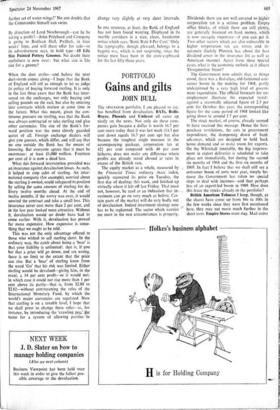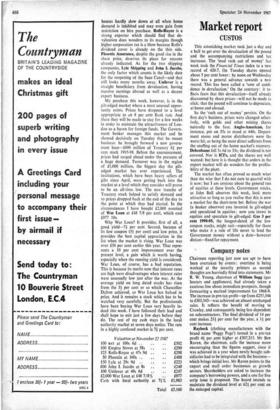Gains and gilts
PORTFOLIO JOHN BULL
The SPECTATOR portfolio, I am pleased to say, has benefited from devaluation. BATs, Rolls- Royce, Phoenix and Unilever all came up, nicely on the news. Not only do these com- panies gain because a dollar is worth 16.7 per cent more today than it was last week (14.3 per cent down equals 16.7 per cent up) but also because the toughest single measure in the accompanying package, corporation tax at 424 per cent compared with 40 per cent hitherto, 'does not make any difference where profits are already taxed abroad at rates in excess of the British rate.
The equity market as a whole, measured by the Financial Times ordinary share index, quickly recovered its poise on Tuesday, the first day of dealings this week, and finished up virtually where it left off last Friday. That must not, however, be read as an indication that in- vestment can go on very much as before. Cer- tain parts of the market will do very badly out of devaluation. Indeed investment strategy now has to be replanned. The sector which worries me most in the new circumstances is property. Dividends there are not well covered so higher corporation tax is a serious problem. Empty office blocks, of which there are still plenty, are generally financed on bank money, which is now savagely expensive—if you can get it. Two other sectors which are also vulnerable to higher, corporation tax are stores and in- surances (luckily Phoenix has about the best dividend cover in the insurance list as well as American income). Apart from these special cases, what is the economic outlook as it affects Throgmorton Street?
The Government now admits that, as things stood, there was a first-class, old-fashioned con- sumer boom in the making for 1968, partly underpinned by a very high level of govern- ment expenditure. The official forecasts for un- employment illustrate the expected trend: against a seasonally adjusted figure of 2.3 per cent for October this year, the corresponding figure for the same period of 1968 looked like going down to around 1.7 per cent.
The stock market, of course, already seemed to have received this message. Hence the hire- purchase restrictions, the cuts in government expenditure, the dampening down of bank advances, which are designed to hold back home demand and so make room for exports. On the Whitehall timetable, the big improve- ment in export deliveries is scheduled to take place not immediately, but during the second six months of 1968 and the first six months of 1969. In fact I believe that we shall still see a consumer boom of sorts next year, simply be- cause the Government has taken no special steps to deal with incomes—and thus perhaps less of an export-led boom in 1969. How does this leave the stocks already in the portfolio?
British American Tobacco I keep, though, as the shares have come up from 84s to 100s in the few weeks since they were first mentioned here, they may not move much further in the short term. Empire Stores must stay. Mail order houses hardly slow down at all when home demand is inhibited and may even gain from restriction on hire purchase. Rolls-Royce is a strong exporter which should find that de- valuation does wonders to its margins though higher corporation tax is a blow because Rolls's dividend cover is already on the thin side. Phoenix Assurance, despite the good rise in the share price, deserves its place for reasons already indicated. As for the two shipping companies, Lyle Shipping and John I. Jacobs, the only factor which counts is the likely date for the reopening of the Suez Canal—and that still looks many months away. Unilever is a straight beneficiary from devaluation, having massive earnings abroad as well as a decent export business.
My purchase this week, however, is in the gilt-edged market where a most unusual oppor- tunity exists. Prices have dropped to a level appropriate to an 8 per cent Bank rate. And there they will be made to stay for a few weeks in order to maintain the attractiveness of Lon- don as a haven for foreign funds. The Govern- ment broker manages this market and he showed decisively on Tuesday that he meant business: he brought forward a new govern- ment loan—£600 million of Treasury 64 per cent stock 1995-98. Before the announcement, prices had surged ahead under the pressure of a huge demand. Turnover was in the region of £1,000 million, the biggest day the gilt- edged market has ever experienced. The institutions, which have been heavy sellers of gilts since April, were getting back into the market at a level which they consider will prove to be an all-time. low. The new tranche of Treasury stock helped to satisfy demand and so prices dropped back at the end of the day to the point at which they had started. In the circumstances I have bought £2,000 nominal of War Loan at £48 7/8 per cent, which cost £977 10s.
Why War Loan? It provides, first of all, a good yield-74 per cent. Second, because of its low coupon (31 per cent) and low price, it provides the best capital appreciation in the list when the market is rising. War Loan was over f56 per cent earlier this year. That repre- sents a 10 per cent improvement over the present level, a gain which is worth having, especially when the running yield is considered. War Loan, of course, has a bad reputation. This is because its merits now that interest rates are high were disadvantages when interest rates were unusually low just after the war. As the average yield on long dated stocks has risen from the 31 per cent or so which Chancellor Dalton achieved, so War Loan has halved in price. And it remains a stock which has to be watched very carefully. But the professionals have been buying War Loan very heavily in- deed this week. I have followed their lead and shall hope to exit just a few days before they do. The rest of my cash stays in the local authority market at seven days notice. The rate in a highly confused market is 74 per cent.
Valuation at November 22 1967 100 BAT at 100s 6d ..
£502 100 Empire Stores at 58s £290 125 Rolls-Royce at 47s 9d £298 50 Phoenix at 160s .. £400 150 Lyle at 29s 9d .. £223 600 John I. Jacobs at 8s .. £240 100 Unilever at 49s 6d .. £247 £2,000 War Loan at £48 7/8% £977
Cash with local authority at 74%
£1,983 Total £5,160















































 Previous page
Previous page